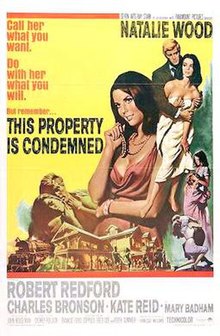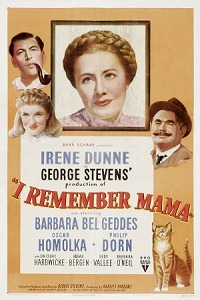
I Remember Mama is a 1948 American drama film directed by George Stevens from a screenplay by DeWitt Bodeen, whose work was adapted from John Van Druten's stage play. Druten, in turn, had based his play on Kathryn Forbes' novel Mama's Bank Account, which was originally published by Harcourt Brace in 1943. The story in all its variant forms recounts the everyday life and economic struggles of a Norwegian immigrant family in San Francisco in the early 20th century. The film stars Irene Dunne as the mother, as well as Barbara Bel Geddes, Oscar Homolka, Ellen Corby and Philip Dorn. Homolka portrays Uncle Chris in the film, a role he had performed earlier in the Broadway production.
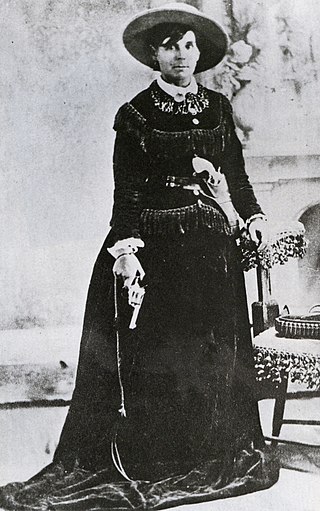
Myra Maybelle Shirley Reed Starr, better known as Belle Starr, was an American outlaw who gained national notoriety after her violent death.

Shining Time Station is a children's television series jointly created by British television producer Britt Allcroft and American television producer Rick Siggelkow. The series was produced by Quality Family Entertainment, in association with Catalyst Entertainment in seasons 2 and 3, for New York City's PBS station WNET, and was originally taped in New York City during its first season and in Toronto during the rest of its run. It incorporated sequences from the British television show Thomas the Tank Engine & Friends, which was in turn based on the books of The Railway Series written by the Reverend Wilbert Awdry. The series aired on PBS from January 29, 1989, until June 11, 1993, with four hour-long "Family Specials" premiering in primetime throughout 1995. Reruns continued to air on PBS until June 11, 1998. Shining Time Station reruns aired on Fox Family from 1998 to 1999, and on Nick Jr. from June to August 2000 to promote the theatrical release of Thomas and the Magic Railroad. The series also aired on Canadian television networks such as APTN and SCN. Elements from the show were incorporated into the 2000 film Thomas and the Magic Railroad.
Britt Allcroft is a British writer, producer, director and voice actress. She is the creator of the children's television series Thomas the Tank Engine & Friends, Shining Time Station, Mr. Conductor's Thomas Tales and Magic Adventures of Mumfie. She also wrote, co-produced and directed the film Thomas and the Magic Railroad (2000).

Kay Starr was an American singer who enjoyed considerable success in the late 1940s and 1950s. She was of Iroquois and Irish heritage. Starr performed multiple genres, such as pop, jazz, and country, but her roots were in jazz.

The Electric Horseman is a 1979 American western comedy-drama film starring Robert Redford and Jane Fonda and directed by Sydney Pollack. The film is about a former rodeo champion who is hired by a cereal company to become its spokesperson and then runs away on a $12 million electric-lit horse and costume he is given to promote it in Las Vegas after he finds that the horse has been abused.

Mary Badham is an American actress who portrayed Jean Louise "Scout" Finch in To Kill a Mockingbird (1962), for which she was nominated for an Academy Award for Best Supporting Actress. At the time, Badham was the youngest actress ever nominated in this category.
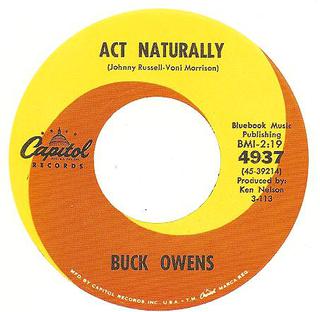
"Act Naturally" is a song written by Johnny Russell, with a writing credit given to Voni Morrison and publishing rights transferred to Buck Owens. It was originally recorded by Buck Owens and the Buckaroos, whose version reached number one on the Billboard Country Singles chart in 1963, his first chart-topper. In 2002, Shelly Fabian of About.com ranked the song number 169 on her list of the Top 500 Country Music Songs.

The Killer That Stalked New York is a 1950 American film noir directed by Earl McEvoy and starring Evelyn Keyes, Charles Korvin and William Bishop. The film, shot on location and in a semi-documentary style, is about diamond smugglers who unknowingly start a smallpox outbreak in the New York City of 1947. It is based on the real threat of a smallpox epidemic in the city, as described in a story taken from a 1948 Cosmopolitan magazine article.

Human Desire is a 1954 American film noir drama starring Glenn Ford, Gloria Grahame and Broderick Crawford directed by Fritz Lang. It is loosely based on Émile Zola's 1890 novel La Bête humaine. The story had been filmed twice before: La Bête humaine (1938), directed by Jean Renoir, and Die Bestie im Menschen, starring Ilka Grüning (1920).
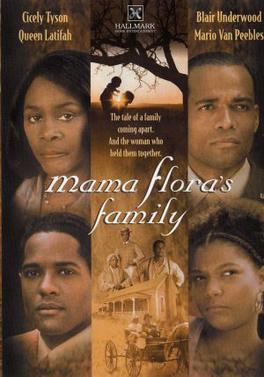
Mama Flora's Family is a 1997 historical fiction novel by Alex Haley and David Stevens. The story spans from the 1920s to the 1970s as it follows Flora, a daughter of poor black Mississippi sharecroppers, and her descendants. Haley died before completing the novel, with Stevens finishing the story line.
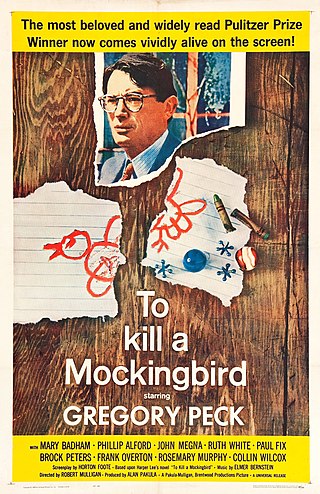
To Kill a Mockingbird is a 1962 American coming-of-age legal drama crime film directed by Robert Mulligan. The screenplay by Horton Foote is based on Harper Lee's 1960 Pulitzer Prize–winning novel of the same name. The film stars Gregory Peck as Atticus Finch and Mary Badham as Scout. It marked the film debut of Robert Duvall, William Windom and Alice Ghostley.
Kathryn McLean, best known by her pen name Kathryn Forbes, was an American writer and memoirist.
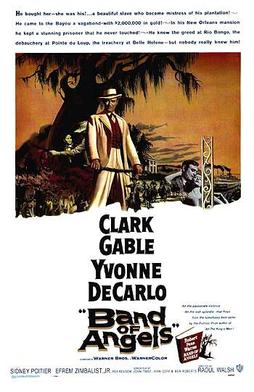
Band of Angels is a 1957 American psychological drama film set in the American South before and during the American Civil War, based on the 1955 novel of the same title by Robert Penn Warren. It starred Clark Gable, Yvonne De Carlo and Sidney Poitier. The movie was directed by Raoul Walsh.

Edison, the Man is a 1940 biographical film depicting the life of inventor Thomas Edison, who was portrayed by Spencer Tracy. Hugo Butler and Dore Schary were nominated for the Academy Award for Best Writing, Original Story for their work on this film. Typical of most Hollywood biopics, much of the film fictionalizes or exaggerates the real events of Edison's life.

We're Not Married! is a 1952 American anthology romantic comedy film directed by Edmund Goulding. It was released by 20th Century Fox.

Walk on the Wild Side is a 1962 American drama film directed by Edward Dmytryk, and starring Laurence Harvey, Capucine, Jane Fonda, Anne Baxter and Barbara Stanwyck. It was adapted from the 1956 novel A Walk on the Wild Side by American author Nelson Algren. The film was scripted by John Fante.

The Bride Walks Out is a 1936 American romantic comedy film directed by Leigh Jason and starring Barbara Stanwyck, Gene Raymond, and Robert Young. Based on an original story by Howard Emmett Rogers, the film is about a woman forced to give up her job as a fashion model by her new husband. Unable to meet her financial obligations, the woman secretly gets another job. The Bride Walks Out was the first of six films Edward Small made at RKO.

A Cry in the Night is a 1956 American film-noir thriller film starring Edmond O'Brien, Brian Donlevy, Natalie Wood and Raymond Burr. Based on the 1955 Whit Masterson novel All Through the Night, it was produced and narrated by Alan Ladd, and directed by Frank Tuttle. Richard Anderson, Irene Hervey, Anthony Caruso, and Peter Hansen appear in support.
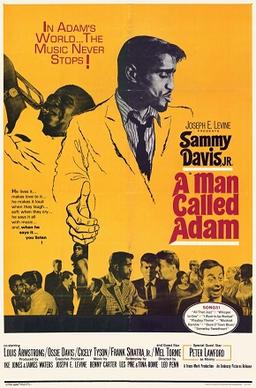
A Man Called Adam is a 1966 American drama musical film directed by Leo Penn and starring Sammy Davis Jr. It tells the story of a self-destructive jazz musician, played by Davis, and his tumultuous relationships with the people in his life.
